- Home
- William Gibson
Count Zero Page 12
Count Zero Read online
Page 12
And then he was in the cockpit, breathing the new-car smell of long-chain monomers, the familiar scent of newly minted technology, and the girl was behind him, an awkward doll sprawled in the embrace of the g-web that Conroy had paid a San Diego arms dealer to install behind the pilot’s web. The plane was quivering, a live thing, and as he squirmed deeper into his own web, he fumbled for the interface cable, found it, ripped the microsoft from his socket, and slid the cable-jack home.
Knowledge lit him like an arcade game, and he surged forward with the plane-ness of the jet, feeling the flexible airframe reshape itself for jump-off as the canopy whined smoothly down on its servos. The g-web ballooned around him, locking his limbs rigid, the gun still in his hand. “Go, motherfucker.” But the jet already knew, and g-force crushed him down into the dark.
“You lost consciousness,” the plane said. Its chip-voice sounded vaguely like Conroy.
“How long?”
“Thirty-eight seconds.”
“Where are we?”
“Over Nagos.” The head-up display lit, a dozen constantly altered figures beneath a simplified map of the Arizona-Sonora line.
The sky went white.
“What was that?”
Silence.
“What was that?”
“Sensors indicate an explosion,” the plane said. “The magnitude suggests a tactical nuclear warhead, but there was no electromagnetic pulse. The locus of destruction was our point of departure.”
The white glow faded and was gone.
“Cancel course,” he said.
“Canceled. New headings, please.”
“That’s a good question,” Turner said. He couldn’t turn his head to look at the girl behind him. He wondered if she were dead yet.
15
BOX
MARLY DREAMED OF ALAIN, dusk in a wildflower field, and he cradled her head, then caressed and broke her neck. Lay there unmoving but she knew what he was doing. He kissed her all over. He took her money and the keys to her room. The stars were huge now, fixed above the bright fields, and she could still feel his hands on her neck. . . .
She woke in the coffee-scented morning and saw the squares of sunlight spread across the books on Andrea’s table, heard Andrea’s comfortingly familiar morning cough as she lit a first cigarette from the stove’s front burner. She shook off the dark colors of the dream and sat up on Andrea’s couch, hugging the dark red quilt around her knees. After Gnass, after the police and the reporters, she’d never dreamed of him. Or if she did, she’d guessed, she somehow censored the dreams, erased them before she woke. She shivered, although it was already a warm morning, and went into the bathroom. She wanted no more dreams of Alain.
“Paco told me that Alain was armed when we met,” she said when Andrea handed her the blue enamel mug of coffee.
“Alain armed?” Andrea divided the omelet and slid half onto Marly’s plate. “What a bizarre idea. It would be like . . . like arming a penguin.” They both laughed. “Alain is not the type,” Andrea said. “He’d shoot his foot off in the middle of some passionate declaration about the state of art and the amount of the dinner bill. He’s a big shit, Alain, but that’s hardly news. If I were you, I’d expend a bit more worry on this Paco. What reason do you have for accepting that he works for Virek?” She took a bite of omelet and reached for the salt.
“I saw him. He was there in Virek’s construct.”
“You saw something—an image only, the image of a child—which only resembled this man.”
Marly watched Andrea eat her half of the omelet, letting her own grow cold on the plate. How could she explain, about the sense she’d had, walking from the Louvre? The conviction that something surrounded her now, monitoring her with relaxed precision; that she had become the focus of at least a part of Virek’s empire. “He’s a very wealthy man,” she began.
“Virek?” Andrea put her knife and fork down on the plate and took up her coffee. “I should say he is. If you believe the journalists, he’s the single wealthiest individual, period. As rich as some zaibatsu. But there’s the catch, really: is he an individual? In the sense that you are, or I am? No. Aren’t you going to eat that?”
Marly began to mechanically cut and fork sections of the cooling omelet, while Andrea continued: “You should look at the manuscript we’re working on this month.”
Marly chewed, raised her eyebrows questioningly.
“It’s a history of the high-orbit industrial clans. A man at the University of Nice did it. Your Virek’s even in it, come to think; he’s cited as a counterexample, or rather as a type of parallel evolution. This fellow at Nice is interested in the paradox of individual wealth in a corporate age, in why it should still exist at all. Great wealth, I mean. He sees the high-orbit clans, people like the Tessier-Ashpools, as a very late variant on traditional patterns of aristocracy, late because the corporate mode doesn’t really allow for an aristocracy.” She put her cup down on her plate and carried the plate to the sink. “Actually, now that I’ve started to describe it, it isn’t that interesting. There’s a great deal of very gray prose about the nature of Mass Man. With caps, Mass Man. He’s big on caps. Not much of a stylist.” She spun the taps and water hissed out through the filtration unit.
“But what does he say about Virek?”
“He says, if I remember all this correctly, and I’m not at all certain that I do, that Virek is an even greater fluke than the industrial clans in orbit. The clans are transgenerational, and there’s usually a fair bit of medicine involved: cryogenics, genetic manipulation, various ways to combat aging. The death of a given clan member, even a founding member, usually wouldn’t bring the clan, as a business entity, to a crisis point. There’s always someone to step in, someone waiting. The difference between a clan and a corporation, however, is that you don’t need to literally marry into a corporation . . .”
“But they sign indentures . . .”
Andrea shrugged. “That’s like a lease. It isn’t the same thing. It’s job security, really. But when your Herr Virek dies, finally, when they run out of room to enlarge his vat, whatever, his business interests will lack a logical focus. At that point, our man in Nice has it, you’ll see Virek and Company either fragment or mutate, the latter giving us the Something Company and a true multinational, yet another home for capital-M Mass Man.” She wiped her plate, rinsed it, dried it, and placed it in the pine rack beside the sink. “He says that’s too bad, in a way, because there are so few people left who can even see the edge.”
“The edge?”
“The edge of the crowd. We’re lost in the middle, you and I. Or I still am, at any rate.” She crossed the kitchen and put her hands on Marly’s shoulders. “You want to take care in this. A part of you is already much happier, but now I see that I could have brought that about myself, simply by arranging a little lunch for you with your pig of a former lover. The rest of it, I’m not sure. . . . I think our academic’s theory is invalidated by the obvious fact that Virek and his kind are already far from human. I want you to be careful . . .” Then she kissed Marly’s cheek and went off to her work as an assistant editor in the fashionably archaic business of printing books.
She spent the morning at Andrea’s, with the Braun, viewing the holograms of the seven works. Each piece was extraordinary in its own way, but she repeatedly returned to the box Virek had shown her first. If I had the original here, she thought, and removed the glass, and one by one removed the objects inside, what would be left? Useless things, a frame of space, perhaps a smell like dust.
She sprawled on the couch, the Braun resting on her stomach, and stared into the box. It ached. It seemed to her that the construction evoked something perfectly, but it was an emotion that lacked a name. She ran her hands through the bright illusion, tracing the length of the fluted, avian bone. She was certain that Virek had already assigned an ornithologist the task of identifying the bird from whose wing that bone had come. And it would be possible to date each objec
t with the greatest precision, she supposed. Each tab of holofiche also housed an extensive report on the known origin of each piece, but something in her had deliberately avoided these. It was sometimes best, when you came to the mystery that was art, to come as a child. The child saw things that were too evident, too obvious for the trained eye.
She put the Braun down on the low table beside the couch and crossed to Andrea’s phone, intending to check the time. She was meeting Paco at one, to discuss the mechanics of Alain’s payment. Alain had told her he would phone her at Andrea’s at three. When she punched for the time service, an automatic recap of satellite news strobed across the screen: a JAL shuttle had disintegrated during reentry over the Indian Ocean, investigators from the Boston-Atlanta Metropolitan Axis had been called in to examine the site of a brutal and apparently pointless bombing in a drab New Jersey residential suburb, militiamen were supervising the evacuation of the southern quadrant of New Bonn following the discovery, by construction workers, of two undetonated wartime rockets believed to be armed with biological weapons, and official sources in Arizona were denying Mexico’s accusation of the detonation of a small-scale atomic or nuclear device near the Sonora border. . . . As she watched, the recap cycled and the simulation of the shuttle began its fire-death again. She shook her head, tapping the button. It was noon.
Summer had come, the sky hot and blue above Paris, and she smiled at the smell of good bread and black tobacco. Her sense of being observed had receded now, as she walked from the métro to the address Paco had given her. Faubourg St. Honoré. The address seemed vaguely familiar. A gallery, she thought.
Yes. The Roberts. The owner an American who operated three galleries in New York as well. Expensive, but no longer quite chic. Paco was waiting beside an enormous panel on which were layered, beneath a thick and uneven coat of varnish, hundreds of small square photographs, the kind produced by certain very old-fashioned machines in train stations and bus terminals. All of them seemed to be of young girls. Automatically, she noted the name of the artist and the work’s title: Read Us the Book of the Names of the Dead.
“I suppose you understand this sort of thing,” the Spaniard said glumly. He wore an expensive-looking blue suit cut in Parisian business style, a white broadcloth shirt, and a very English-looking tie, probably from Charvet. He didn’t look at all like a waiter now. There was an Italian bag of black ribbed rubber slung over his shoulder.
“What do you mean?” she asked.
“Names of the dead,” and he nodded in the direction of the panel. “You were a dealer in these things.”
“What don’t you understand?”
“I sometimes feel as though this, this culture, is entirely a trick. A ruse. All my life I have served Señor, in one guise or another, you understand? And my work has not been without its satisfactions, moments of triumph. But never, when he involved me with this business of art, have I felt any satisfaction. He is wealth itself. The world is filled with objects of great beauty. And yet Señor pursues . . .” He shrugged.
“You know what you like, then.” She smiled at him. “Why did you choose this gallery for our meeting?”
“Señor’s agent purchased one of the boxes here. Haven’t you read the histories we provided you with in Brussels?”
“No,” she said. “It might interfere with my intuition. Herr Virek is paying for my intuition.”
He raised his eyebrows. “I will introduce you to Picard, the manager. Perhaps he can do something for this intuition of yours.”
He led her across the room and through a doorway. A graying, heavyset Frenchman in a rumpled corduroy suit was speaking into the handset of a phone. On the phone’s screen she saw columns of letters and figures. The day’s quotations on the New York market.
“Ah,” the man said, “Estevez. Excuse me. Only a moment.” He smiled apologetically and returned to his conversation. Marly studied the quotations. Pollock was down again. This, she supposed, was the aspect of art that she had the most difficulty understanding. Picard, if that was the man’s name, was speaking with a broker in New York, arranging the purchase of a certain number of “points” of the work of a particular artist. A “point” might be defined in any number of ways, depending on the medium involved, but it was almost certain that Picard would never see the works he was purchasing. If the artist enjoyed sufficient status, the originals were very likely crated away in some vault, where no one saw them at all. Days or years later, Picard might pick up that same phone and order the broker to sell.
Marly’s gallery had sold originals. There was relatively little money in it, but it had a certain visceral appeal. And, of course, there had been the chance that one would get lucky. She had convinced herself that she’d gotten very lucky indeed when Alain had arranged for the forged Cornell to surface as a wonderful, accidental find. Cornell had his place on the broker’s board, and his “points” were very expensive.
“Picard,” Paco said, as though he were addressing a servant, “this is Marly Krushkhova. Señor has brought her into the matter of the anonymous boxes. She may wish to ask you questions.”
“Charmed,” Picard said, and smiled warmly, but she thought she detected a flicker in his brown eyes. Very likely, he was trying to connect the name to some scandal, relatively recent.
“I understand that your gallery handled the transaction, then?”
“Yes,” Picard said. “We had displayed the work in our New York rooms, and it had attracted a number of bids. We decided to give it its day in Paris, however,”—he beamed— “and your employer made our decision most worthwhile. How is Herr Virek, Estevez? We have not seen him in several weeks . . .”
Marly glanced quickly at Paco, but his dark face was smooth, utterly controlled.
“Señor is very well, I would think,” he said.
“Excellent,” said Picard, somewhat too enthusiastically. He turned to Marly. “A marvelous man. A legend. A great patron. A great scholar.”
Marly thought she heard Paco sigh.
“Could you tell me, please, where your New York branch obtained the work in question?”
Picard’s face fell. He looked at Paco, then back at Marly. “You don’t know? They haven’t told you?”
“Could you tell me, please?”
“No,” Picard said, “I’m sorry, but I can’t. You see, we don’t know.”
Marly stared at him. “I beg your pardon, but I don’t quite see how that is possible . . .”
“She hasn’t read the report, Picard. You tell her. It will be good for her intuition, to hear it from your own lips.”
Picard gave Paco an odd look, then regained his composure. “Certainly,” he said. “A pleasure . . .”
“Do you think it’s true?” she asked Paco as they stepped out into Faubourg St. Honoré and summer sunlight. The crowds were thick with Japanese tourists.
“I went to the Sprawl myself,” Paco said, “and interviewed everyone involved. Roberts left no record of the purchase, although ordinarily he was no more secretive than the next art dealer.”
“And his death was accidental?”
He put on a pair of mirrored Porsche glasses. “As accidental as that sort of death ever is,” he said. “We have no way of knowing when or how he obtained the piece. We located it, here, eight months ago, and all our attempts to work backward end with Roberts, and Roberts has been dead for a year. Picard neglected to tell you that they very nearly lost the thing. Roberts kept it in his country house, along with a number of other things that his survivors regarded as mere curiosities. The whole lot came close to being sold at public auction. Sometimes I wish it had been.”
“These other things,” she asked, falling into step beside him, “what are they?”
He smiled. “You think we haven’t tracked them, each one? We have. They were”—here he frowned, exaggerating the effort of memory—“ ‘a number of rather unremarkable examples of contemporary folk art’ . . .”
“Was Roberts known to be intereste
d in that sort of thing?”
“No,” he said, “but approximately a year before his death, we know that he made application for membership in the Institut de l’Art Brut, here in Paris, and arranged to become a patron of the Aeschmann Collection in Hamburg.”
Marly nodded. The Aeschmann Collection was restricted to the works of psychotics.
“We are reasonably certain,” Paco continued, taking her elbow and guiding her around a corner, into a side street, “that he made no attempt to use the resources of either, unless he employed an intermediary, and we regard that as unlikely. Señor, of course, has employed several dozen scholars to sweep the records of both institutions. To no avail . . .”
“Tell me,” she said, “why Picard assumed that he had recently seen Herr Virek. How is that possible?”
“Señor is wealthy. Señor enjoys any number of means of manifestation.”
Now he led her into a chrome-trimmed barn of a place, glittering with mirrors, bottles, and arcade games. The mirrors lied about the depth of the room; at its rear, she could see the reflected pavement, the legs of pedestrians, the flash of sunlight on a hubcap. Paco nodded to a lethargic-looking man behind the bar and took her hand, leading her through the tightly packed shoal of round plastic tables.
“You can take your call from Alain here,” he said. “We have arranged to reroute it from your friend’s apartment.” He drew a chair out for her, an automatic bit of professional courtesy that made her wonder if he might actually once have been a waiter, and placed his bag on the tabletop.
“But he’ll see that I’m not there,” she said. “If I blank the video, he’ll become suspicious.”
“But he won’t see that. We’ve generated a digital image of your face and the required background. We’ll key that to the image on this phone.” He took an elegant modular unit from the bag and placed it in front of her. A paper thin polycarbon screen unfurled silently from the top of the unit and immediately grew rigid. She had once watched a butterfly emerge into the world, and seen the transformation of its drying wings. “How is that done?” she asked, tentatively touching the screen. It was like thin steel.

 Pattern Recognition
Pattern Recognition Spook Country
Spook Country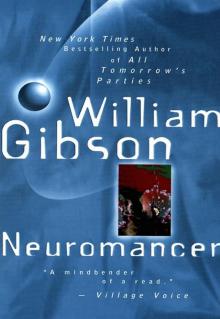 Neuromancer
Neuromancer Skinner's Room
Skinner's Room The Difference Engine
The Difference Engine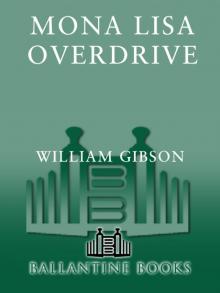 Mona Lisa Overdrive
Mona Lisa Overdrive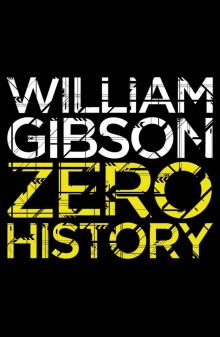 Zero History
Zero History The Peripheral
The Peripheral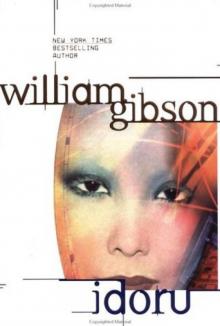 Idoru
Idoru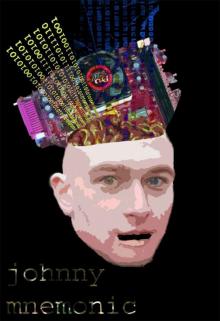 Johnny Mnemonic
Johnny Mnemonic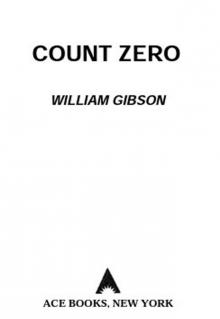 Count Zero
Count Zero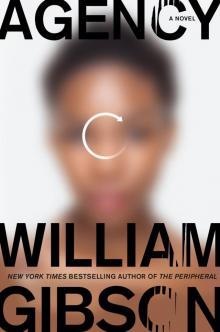 Agency
Agency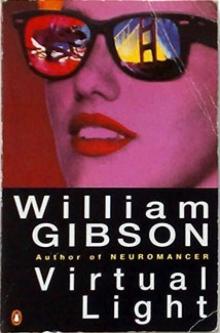 Virtual Light
Virtual Light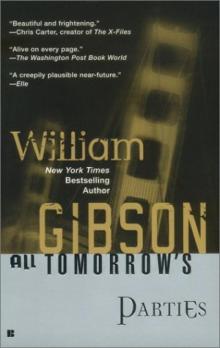 All Tomorrow's Parties
All Tomorrow's Parties The Miracle Worker
The Miracle Worker Disneyland with the Death Penalty
Disneyland with the Death Penalty Idoru tb-2
Idoru tb-2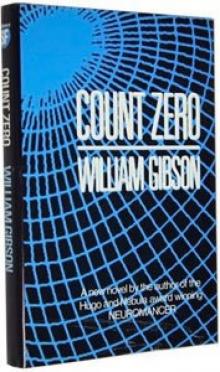 Count Zero s-2
Count Zero s-2 The Gernsback Continuum
The Gernsback Continuum New Rose hotel (tales)
New Rose hotel (tales)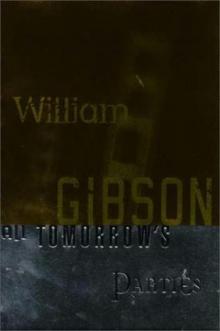 All Tomorrow's Parties bt-3
All Tomorrow's Parties bt-3 Hinterlands
Hinterlands Thirteen Views Of A Cardboard City
Thirteen Views Of A Cardboard City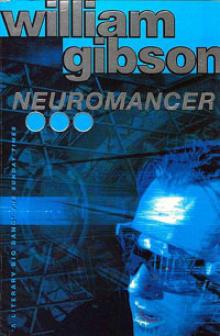 Neuromancer ts-1
Neuromancer ts-1 Virtual light b-1
Virtual light b-1